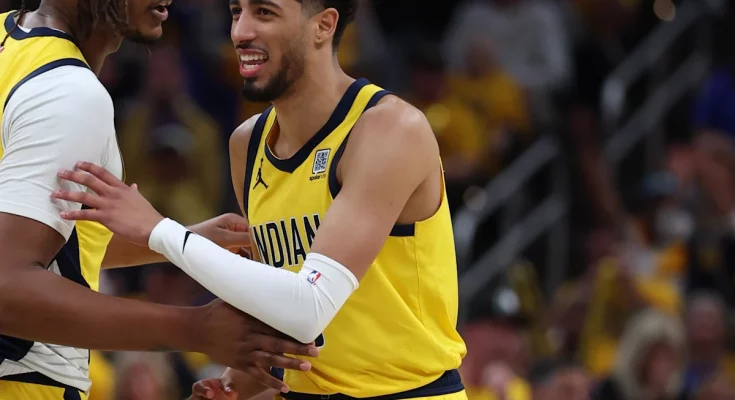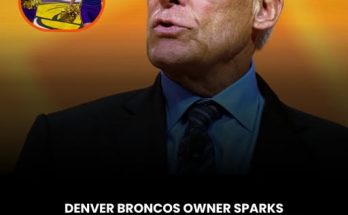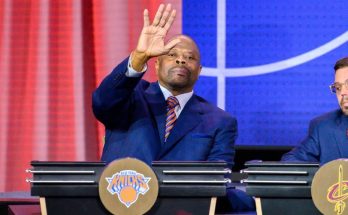Tyrese Haliburton, the Indiana Pacers’ dynamic young point guard, recently opened up on what has been one of the most talked-about moves of the NBA offseason: the departure of longtime teammate Myles Turner to the Milwaukee Bucks. In a candid interview, Haliburton didn’t hold back his emotions, admitting that while he “doesn’t want to see” Turner in a rival jersey, he understands that player movement is part of the modern NBA. His reaction reflects both the human side of professional sports and the challenges of maintaining team chemistry amid the ever-changing landscape of trades, free agency, and team-building strategies.
Turner’s exit marks a significant shift for the Pacers, who are attempting to redefine themselves around Haliburton’s rising stardom. For years, Turner served as the anchor in the middle, providing elite rim protection, consistent scoring in the post, and a stabilizing presence on both ends of the floor. His relationship with Haliburton was more than professional; the two shared a bond that translated into on-court synergy. Haliburton’s acknowledgment of disappointment is rooted in that connection. “I don’t want to see him there,” Haliburton said, capturing the sentiment many players feel when teammates transition to direct competitors. There’s a mix of personal loss and professional rivalry that comes with seeing a trusted teammate don a rival’s colors.
However, Haliburton also demonstrated maturity in his response, noting, “but it is what it is.” This short phrase carries significant weight, reflecting an acceptance of the realities of the NBA. Contracts, team strategies, and market dynamics often dictate player movement, leaving athletes with limited control over where their colleagues ultimately land. In this context, Haliburton’s comment balances personal feelings with professional pragmatism, signaling both respect for Turner’s choice and recognition that basketball is ultimately a business.
Turner’s move to the Bucks is particularly impactful given Milwaukee’s aspirations to contend for a championship. The Bucks have been steadily building a roster around Giannis Antetokounmpo, combining veteran leadership with high-caliber talent. Adding Turner, a proven defensive anchor and floor-spacing big man, strengthens their bid for sustained success. For Haliburton and the Pacers, this development introduces a new layer of competition. Facing a former teammate in critical matchups inevitably intensifies the stakes, but it also offers an opportunity for Haliburton to showcase leadership and resilience as the team recalibrates.
Indiana’s front office now faces the dual challenge of managing the void left by Turner while leveraging Haliburton’s exceptional abilities to chart a path forward. Haliburton’s skill set—his vision, decision-making, and clutch shooting—positions him as the focal point of the franchise. His reaction to Turner’s departure indicates a commitment to leading the team through this transitional phase. While he expressed personal disappointment, Haliburton’s acknowledgment that “it is what it is” underscores a readiness to adapt, a critical mindset for guiding a team through roster shifts and competitive pressures.
The broader implications of Turner’s move extend beyond the Pacers’ immediate concerns. It highlights the increasingly fluid nature of player careers in the modern NBA. Free agency, trades, and buyouts have made team compositions more dynamic than ever before. Players, even those with deep ties to their current squads, must navigate these realities while maintaining professionalism and competitive focus. Haliburton’s response exemplifies how athletes can process such changes—acknowledging personal feelings while remaining strategically focused on the game ahead.
Haliburton’s comments also provide insight into the psychological dimensions of professional sports. When a teammate leaves, especially to a team that will directly compete against one’s own, emotions can run high. Disappointment, frustration, and even a sense of betrayal are common, but so too is the drive to elevate performance in response to challenges. For Haliburton, this moment may serve as a catalyst for growth, motivating him to refine his game, embrace leadership responsibilities, and rally his teammates around a shared objective.
The Indiana fan base is likely to interpret Haliburton’s remarks in a similar light. Fans understand the bond between Turner and Haliburton, and many will empathize with the feeling of seeing a star player leave for a rival. However, Haliburton’s candid yet composed approach offers reassurance. By framing the situation with both honesty and acceptance, he positions himself as a leader capable of navigating adversity while maintaining a competitive mindset. This balance between emotional transparency and professional composure is crucial for a young team seeking to build consistency and identity in a challenging Eastern Conference landscape.
The timing of Turner’s move is also significant. Coming off a season in which the Pacers were close to contending for higher playoff positioning, the loss of a key piece could have destabilized team morale. Haliburton’s measured response helps mitigate this risk. By publicly acknowledging his feelings while emphasizing acceptance, he sets a tone for the locker room, encouraging teammates to focus on controllable factors such as preparation, execution, and teamwork rather than dwelling on what has been lost.
Moreover, Haliburton’s stance highlights a broader narrative about player loyalty and agency in the NBA. While fans often interpret roster changes through the lens of allegiance, players themselves operate in a professional ecosystem where opportunities, contracts, and career trajectories influence decisions. Turner’s move, and Haliburton’s reaction, underscore the complexity of these dynamics. Athletes balance personal relationships, competitive instincts, and professional ambitions, all within a landscape defined by financial stakes and organizational strategy. Haliburton’s comments reveal an understanding of these nuances, reflecting both maturity and awareness of the broader context.
For analysts and commentators, Haliburton’s remarks provide valuable insight into team culture and leadership dynamics. His reaction demonstrates emotional intelligence, an essential trait for guiding a young, evolving roster. By validating personal disappointment without allowing it to overshadow team goals, Haliburton models behavior that can influence teammates’ responses to similar challenges. This approach not only strengthens team cohesion but also sets expectations for professionalism and accountability, critical factors in sustaining competitive performance over a full season.
Looking ahead, the Pacers’ trajectory will be closely linked to Haliburton’s development as a leader. Turner’s departure, while impactful, creates opportunities for other players to step into more prominent roles. It also offers Haliburton the chance to define his legacy within the franchise. His handling of this situation signals to teammates, coaches, and fans that he is ready to embrace responsibility, navigate adversity, and maintain focus on collective objectives. This mindset will be instrumental in shaping Indiana’s competitiveness in the coming seasons.
From a strategic perspective, the Pacers may respond to Turner’s exit by exploring roster adjustments, targeting complementary pieces, or emphasizing player development. Haliburton’s leadership will be central to these efforts, as he guides new and existing teammates through both on-court systems and locker room dynamics. His ability to balance personal sentiment with professional focus sets a precedent for how the organization approaches challenges, potentially influencing team culture for years to come.
In conclusion, Tyrese Haliburton’s reaction to Myles Turner’s move to the Milwaukee Bucks offers a compelling glimpse into the intersection of emotion, professionalism, and leadership in the NBA. By expressing disappointment while acknowledging the reality of the situation, Haliburton demonstrates a maturity beyond his years. His comments serve as both a personal reflection and a strategic statement, signaling his readiness to lead the Pacers through a transitional period. Turner’s departure is a significant moment for Indiana, but Haliburton’s response highlights resilience, adaptability, and the competitive drive that defines elite athletes. As the Pacers prepare for the upcoming season, Haliburton’s ability to channel emotion into leadership will be a defining factor in the team’s pursuit of success, both on the scoreboard and within the broader culture of the franchise. His words, simple yet profound, encapsulate the dual realities of professional sports: the personal connections that make the game meaningful and the professional imperatives that drive it forward. “I don’t want to see him there, but it is what it is” is more than a statement—it’s a testament to navigating change with poise, focus, and unwavering commitment to the game.



